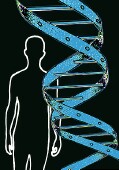- The Best Time of Day to Drink Bone Broth to Maximize Health Benefits
- 8 Ways to Increase Dopamine Naturally
- 7 Best Breads for Maintaining Stable Blood Sugar
- Gelatin vs. Collagen: Which is Best for Skin, Nails, and Joints?
- The Long-Term Effects of Daily Turmeric Supplements on Liver Health
- Could Your Grocery Store Meat Be Causing Recurring UTIs?
- Are You Making This Expensive Thermostat Error This Winter?
- Recognizing the Signs of Hypothyroidism
- 10 Strategies to Overcome Insomnia
- Could Artificial Sweeteners Be Aging the Brain Faster?
Scientists Make Gene Discovery in Lou Gehrig’s Disease


A new gene mutation associated with amyotrophic lateral sclerosis — also known as ALS or Lou Gehrig’s disease — has been identified in a study led by the U.S National Institute on Aging (NIA).
ALS is a fatal degenerative condition that kills nerve cells, resulting in weakness and paralysis. Patients typically die from respiratory failure. About 10 percent of ALS patients have a directly inherited form of the disease, according to the NIA.
In the study, published online March 30 in Nature Neuroscience, researchers analyzed DNA from families with several members who’d been diagnosed with ALS. The analysis revealed that a number of people in those families had a mutation in a gene called Matrin 3.
The investigators also discovered that Matrin 3 interacts with a protein that binds to RNA and whose mutation is known to cause ALS, according to the study published online March 30 in Nature Neuroscience.
“The identification of this gene mutation gives us another target to explore in the [development] of this disease,” senior author Dr. Bryan Traynor, of the laboratory of neurogenetics at the NIA, said in an agency news release.
“It also provides additional evidence that some disruption in RNA metabolism, an essential process within all cells, is involved in neuron death in ALS,” he added.
Each year, about 6,000 Americans die from ALS.
More information
The U.S. National Institute of Neurological Disorders and Stroke has more about ALS.
Source: HealthDay
Copyright © 2026 HealthDay. All rights reserved.










